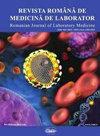Mutations in the KRAS gene as a predictive biomarker of therapeutic response in patients with colorectal cancer
IF 0.5
4区 医学
Q4 MEDICINE, RESEARCH & EXPERIMENTAL
引用次数: 0
Abstract
Abstract Introduction: Despite the important role of general KRAS mutational status in the selection of an adequate therapeutic protocol in patients with colorectal cancer (CRC), studies that focus on its specific mutations and their significance on progression of disease are scarce. This study aimed to determine the significance of specific KRAS mutations in response to standard chemotherapy protocols with oxaliplatin-based (FOLFOX 4, OXFL) in the first-line and irinotecan-based chemotherapy (FOLFIRI, IFL) in the second-line therapy, and to evaluate the correlation between these mutations and clinicopathological characteristics of CRC patients. Methods: Genomic DNA was extracted from the FFPE tumour tissue sections while the KRAS mutation test was performed by using PCR methods. Results: Prevalence of KRAS gene mutations in CRC patients was 45%. Mutated KRAS was more frequent in later stages of tumor infiltrations (P =0.0017), on the right side of the colon (P= 0.0044), and in patients who developed metastases in the first 6 months after CRC diagnosis than in patients who developed metastases after 24 months (P=0.0083). In a group of patients with a poor therapeutic response to standard chemotherapy the most frequent mutations in KRAS gene were G12D and G12V (63.88%), while in a group of patients with a good response to therapeutic protocols the most prevalent mutation was G12A (66.66%). Conclusion: Our results indicate that there was a significant difference in biological behaviour between tumours harboring different mutations in KRAS gene. Overall, mutation G12A could be a novel prognostic biomarker for CRC patients treated with standard chemotherapy.KRAS基因突变作为结直肠癌患者治疗反应的预测性生物标志物
摘要简介:尽管KRAS的一般突变状态在结直肠癌(CRC)患者选择适当的治疗方案中发挥着重要作用,但关注其特异性突变及其对疾病进展意义的研究很少。本研究旨在确定KRAS特异性突变在一线以奥沙利铂为基础的化疗方案(FOLFOX 4, OXFL)和二线以伊立替康为基础的化疗方案(FOLFIRI, IFL)反应中的意义,并评估这些突变与CRC患者临床病理特征的相关性。方法:从FFPE肿瘤组织切片提取基因组DNA,采用PCR方法进行KRAS突变检测。结果:KRAS基因突变在结直肠癌患者中的发生率为45%。KRAS突变在肿瘤浸润晚期(P= 0.0017)、结肠右侧(P= 0.0044)以及结直肠癌诊断后6个月内发生转移的患者中比24个月后发生转移的患者(P=0.0083)更为常见。在对标准化疗反应较差的患者组中,KRAS基因最常见的突变是G12D和G12V(63.88%),而在对治疗方案反应良好的患者组中,最常见的突变是G12A(66.66%)。结论:我们的研究结果表明,KRAS基因不同突变的肿瘤在生物学行为上存在显著差异。总之,突变G12A可能是标准化疗结直肠癌患者的一种新的预后生物标志物。
本文章由计算机程序翻译,如有差异,请以英文原文为准。
求助全文
约1分钟内获得全文
求助全文
来源期刊

Revista Romana De Medicina De Laborator
MEDICINE, RESEARCH & EXPERIMENTAL-
CiteScore
0.31
自引率
20.00%
发文量
43
审稿时长
>12 weeks
期刊介绍:
The aim of the journal is to publish new information that would lead to a better understanding of biological mechanisms of production of human diseases, their prevention and diagnosis as early as possible and to monitor therapy and the development of the health of patients
 求助内容:
求助内容: 应助结果提醒方式:
应助结果提醒方式:


